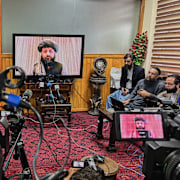Wikipedia (en)
The Carter Doctrine was a policy proclaimed by President of the United States Jimmy Carter in his State of the Union Address on January 23, 1980, which stated that the United States would use military force, if necessary, to defend its national interests in the Persian Gulf. It was a response to the Soviet Union's intervention in Afghanistan in 1979, and it was intended to deter the Soviet Union, the United States' Cold War adversary, from seeking hegemony in the Persian Gulf region.
The following key sentence, which was written by Zbigniew Brzezinski, President Carter's National Security Adviser, concludes the section:
Let our position be absolutely clear: An attempt by any outside force to gain control of the Persian Gulf region will be regarded as an assault on the vital interests of the United States of America, and such an assault will be repelled by any means necessary, including military force.
Brzezinski modeled the wording on the Truman Doctrine, and insisted the sentence to be included in the speech "to make it very clear that the Soviets should stay away from the Persian Gulf."In The Prize: The Epic Quest for Oil, Money, and Power, author Daniel Yergin notes that the Carter Doctrine "bore striking similarities" to a 1903 British declaration in which British Foreign Secretary Lord Landsdowne warned Russia and Germany that the British would "regard the establishment of a naval base or of a fortified port in the Persian Gulf by any other power as a very grave menace to British interests, and we should certainly resist it with all the means at our disposal."Others have critiqued the doctrine for its blatant defence of U.S. Imperialism. Namely, "Carter declared the Persian Gulf to be an area of 'vital interest' to U.S. 'national security,' and stated that the U.S. would use military force to defend those interests. This was a blatant assertion of imperialist sphere of influence over other sovereign nations." Similarly, this recuperation of pro-interventionist thrust of Carter’s speech marked a reactionary shift from some of the currents in U.S. foreign policy which had developed over the past decade, i.e. the ruling classes realised that U.S.’s policy of 'detente' with the Soviets increased their economy and thus fuelled Soviet expansion, which competed with U.S. imperialism’s interests over global hegemony.




